Source: China Unofficial Archives (8/19/25)
The Flower of Thought That Blossomed in a Barren Wasteland: Yu Luoke and “On Class Origins”
By Hu Ping
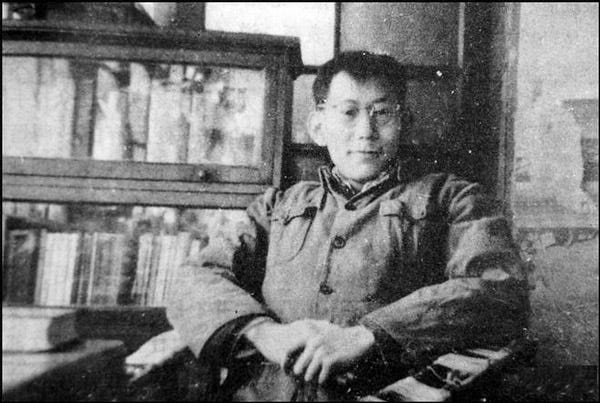
Yu Luoke at home (1967).
[中国民间档案馆 China Unofficial Archives is a reader-supported publication. To receive new posts and support our work, please consider becoming a free or paid subscriber at the above link]
Exactly 59 years ago, in the “Red August” that followed the outbreak of the Cultural Revolution in 1966, a couplet was everywhere in China: “If a father is a hero, then his son is a true man; if a father is a reactionary, then his son is a bastard.” Yu Luoke, a 24-year-old apprentice in Beijing, wrote a long article titled “On Class Origins” (also known in English as “On Family Background”). It was the most powerful challenge to the Chinese Communist Party’s long-standing policy of discrimination against people–including their children–who belonged to certain classes in society that the party defined as its enemies.
In that darkest of times, Yu raised a powerful voice for equality and human rights, shaking the entire country in a way not seen since the founding of the People’s Republic of China nearly two decades earlier. In January 1968, Yu was arrested and imprisoned. On March 5, 1970, the authorities executed him as a “counter-revolutionary,” at the age of 27.
Yu’s impact was all the more remarkable because he had been into a family belonging to one of the “five black categories” (heiwulei) of defined class enemies: landlords, rich farmers, counter-revolutionaries, rightists, and a catch-all group known as bad elements. One might assume this discrimination would weaken as time passed and the authorities’ power became more secure. However, in the 1960s, discrimination against the children of class enemies actually grew more severe. This was partly because Mao Zedong, in 1962, called on everyone to “never forget class struggle.”
Another unofficial reason, as I recall from that time, was that my generation of young people and the “second-generation reds”—children of early communist revolutionaries and party members—were all competing for university admissions, jobs, and social status. The old revolutionaries discovered that their children’s academic performance and other abilities were disappointing. The Communist Party didn’t want to appear to be granting open privileges, so it used class differentiation—the “class line”—as a tool, making family background the primary criterion for evaluation. This ensured that the second-generation reds would win the competition. Children from ordinary families were sidelined, and the children of class enemies became the biggest victims.
It’s probably hard for young people today to imagine how widespread, serious, and absurd class-origin discrimination was during the Mao era. Before the Cultural Revolution, children from families belonging to the five black categories were already oppressed. Under the pretext of upholding the class line, these children were marginalized everywhere and were denied any good opportunities. A bad family background meant you were an inferior person.
The Cultural Revolution pushed this oppression to an extreme. In the Red August of 1966, with Mao Zedong’s support, Red Guards—primarily composed of second-generation reds—took the political stage. They aggressively promoted the “proletarian line,” proposing a division of people into “five red categories” (workers, poor peasants, revolutionary cadres, revolutionary soldiers, and revolutionary martyrs) and “five black categories” based on family background. The black categories were later expanded to seven, adding “capitalists” and “capitalist roaders.”
The couplet—“If a father is a hero, then his son is a true man; if a father is a reactionary, then his son is a bastard”—spread nationwide. It was used to openly criticize and humiliate classmates from families of the five black categories. In many places, students from these families were beaten, killed, or forced to commit suicide. In Daxing County, Beijing, a five-day massacre of families of the five black categories and their relatives occurred, resulting in 325 deaths. The oldest victim was 80, the youngest only 38 days old, and 22 families were completely wiped out.
However, things soon changed. Mao’s purpose for the Cultural Revolution was to attack “capitalist roaders in power within the Party,” so the Red Guards’ attacks on the children of the five black categories were seen as a distraction. Also, because many Red Guards’ own parents were being persecuted, they became resistant to the movement and were labeled the “dads-and-moms-protection faction,” which didn’t please Mao. In October 1966, Chen Boda, the head of the Central Cultural Revolution Group, gave a speech in which he specifically mentioned the couplet, criticizing it as promoting a “reactionary theory of bloodline.” As criticism of the couplet emerged nationwide, youths belonging to the five black categories felt liberated.
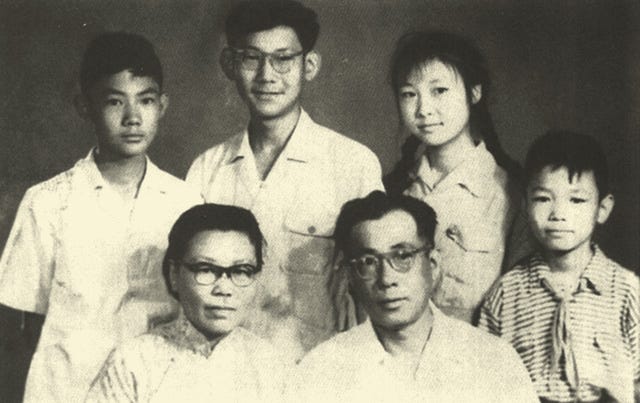
A 1959 photo of Yu Luoke’s family. Front (left to right): Wang Qiulin, Yu Chongji. Back (left to right): Yu Luowen, Yu Luoke, Yu Luojin, Yu Luomian.
1
Yu Luoke was born in Beijing in 1942. Both of his parents had studied in Japan. His father Yu Chongji was an engineer, and his mother Wang Qiulin was a private factory manager. Both were labeled “rightists” in 1957. Yu was an excellent student, but he was not admitted to college after taking the entrance exam in 1960 due to his family background. He tried again in 1962 and was still not accepted. Yu continued to study diligently on his own and paid close attention to national affairs. He began writing “On Class Origins” during the peak of the couplet’s popularity in the “Red August” of 1966.
In October 1966, his younger brothers, Yu Luowen and Yu Luomian, mimeographed several hundred copies of “On Class Origins” and distributed them in Guangzhou. Mou Zhijing, a second-year high school student at Beijing No. 4 High School (a prominent school that many second-generation reds attended) who had opposed the couplet during “Red August,” read “On Class Origins” and cherished it. He immediately worked with the Yu brothers to start a printed tabloid called Middle School Cultural Revolution News. The first issue, published on January 18, 1967, printed the full three-page text of “On Class Origins,” crediting it to the “Beijing Research Group on Family Background Issues” instead of Yu Luoke.
The article immediately sparked a strong reaction in Chinese society. Middle School Cultural Revolution News went on to publish six more issues, each containing a long article by Yu Luoke with credits going to the “Beijing Research Group on Family Background Issues.” When the tabloid was sold on the streets, the lines of people waiting to buy it were so long that sales had to be limited. The number of letters from readers across the country was so great that mail carriers couldn’t deliver them all; Yu Luowen had to pick them up from the post office every day with a tricycle. The tabloid became a valuable collectible, with a two-cent copy selling for as much as two yuan. In many cities, people copied, posted, or reprinted it.
I was in the graduating class of 1966 at Chengdu No. 19 Middle School when the Cultural Revolution broke out. My family belonged to one of the five black categories, and I felt the sting of discrimination deeply. For example, when I graduated from middle school in 1963 and took the high school entrance exam, my scores were among the top in the city, but none of the top high schools in Chengdu I applied to accepted me. I was assigned to a school far from home, with one of the lowest teaching standards in the city. When I was preparing for college, an elder told me, “With your scores, you could get into any university in the country; but with your family background, no university will accept you.”
In August 1966, the couplet reached Chengdu. The Red Guards at my school organized a so-called “class line” debate, which was really just a criticism session. Many classmates belonging to the five black categories were called up to publicly admit they were “bastards.” For about three days of the three-and-a-half-day debate, I was the main target of criticism. I had thought a lot about the class line, so I went on stage repeatedly to refute the couplet. The immense pressure of that debate would be unforgettable for the rest of my life.
In early February 1967, in a classmate’s dorm room at another school, I read the issue of Middle School Cultural Revolution News that contained “On Class Origins.” I felt like I was reading my own thoughts. I had suffered greatly from discrimination and had similar experiences and ideas as the author. For the first time, I realized that someone else felt the same way I did about the class line, and had expressed it so precisely, clearly, and profoundly. My classmates and I then decided to start a tabloid—the first printed tabloid for high school students in Chengdu—to reprint the article credited to the “Beijing Research Group on Family Background Issues.”
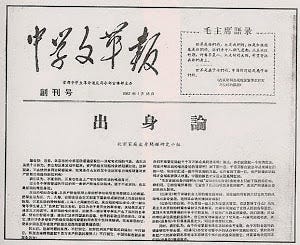
The first issue of Middle School Cultural Revolution News printing “On Class Origins.”
2
The first sentence of “On Class Origins” reads: “The issue of family background has been a longstanding, serious social problem.” With this simple statement, Yu Luoke’s criticism was aimed not just at the couplet, but directly at the class line. (By the way, after Chen Boda criticized the couplet as a theory of bloodline, many people called it that. But theoretically, the couplet’s content isn’t a theory of bloodline because it emphasizes social influence rather than innate biological inheritance.) In his critique, Yu first analyzed the couplet, pointing out that social influence on a person is greater than family influence, which refuted the idea that “if a father is a reactionary, then his son is a bastard.”
Next, Yu focused on the importance of “performance.” He pointed out that family background and a person’s class status are completely different things, writing, “If I may ask: If a person has a bad background but performs well, can we dismiss their achievements? If a person has a good background but performs poorly, can we excuse their shortcomings? If a person has a bad background and performs poorly, should their sins be compounded? If a person has a good background and performs well, should their virtues be exaggerated? Is it reasonable to do so?”
Yu further pointed out that “looking at both background and performance” inevitably leads to the slippery slope of “only looking at background and not performance.” A person’s background is easy to see, but their performance is not. People naturally favor the easier and safer option, tending to emphasize background over performance, or simply ignoring performance altogether.
Furthermore, in response to the revolutionary rhetoric that framed class discrimination as a test of revolutionary zeal, Yu retorted, “Put away your tests… Have you forgotten Marx’s words? To demand perfection from the unfortunate is immoral!” “On Class Origins” also refuted the view that “your fathers oppressed our fathers, so we will not be kind to you now!” This idea was rarely expressed in public writings, but it was the deep, unspoken belief of many who advocated for class discrimination. Yu deliberately brought it to light, putting his opponents in an awkward position. Finally, “On Class Origins” called on the “most oppressed young people” and “all revolutionary youths persecuted by reactionary forces” to fight, declaring that “victory will surely belong to you.”
The writing style of “On Class Origins” was fresh and elegant. Compared to the popular essays of the time, the article’s style stood out. The prevailing style then was exaggerated, arrogant, coarse, and dogmatic, but “On Class Origins” was not influenced by the grandiose style. It was simple, calm, detailed, and rigorous.
The article’s byline, “Beijing Research Group on Family Background Issues,” was unique, as it wasn’t a “regiment,” a “commune,” or a “combat group,” as was common during the Cultural Revolution, nor did it have a revolutionary name like “Revolution,” “Rebels,” “The East is Red,” or “Jinggangshan.” The brilliance of “On Class Origins” lies not only in its arguments but also in its powerful and well-reasoned logic. Many articles during the Cultural Revolution were known for their daring arguments, but their reasoning was often perfunctory and uninspiring. “On Class Origins” was different; its logical, precise, and powerful arguments not only supported the author’s points but also offered readers a wider perspective and inspiration.
However, news from Beijing soon arrived. On April 14, 1967, Qi Benyu, a member of the Central Cultural Revolution Group, gave a speech to representatives of the Beijing Red Guard Congress, criticizing “On Class Origins” as a “big poisonous weed.” Qi Benyu claimed, “‘On Class Origins’ tells people to ignore class status, denies the class viewpoint, and uses an objectivist and bourgeois viewpoint to attack socialism. It is actually promoting Peng Zhen’s ideas and inciting youth to oppose the Party.”
Before this, I had firmly believed that “On Class Origins” was correct and in line with Mao Zedong Thought, completely beyond criticism. Reading Qi Benyu’s speech, I felt both disgust and fear. Qi Benyu said that “‘On Class Origins’ tells people to ignore class status,” which was a clear attempt to distort the distinction between family background and a person’s class status—a distinction the article had already made very clear.
The only part of Qi Benyu’s speech that confused me was the philosophical term “objectivism.” We had been taught that subjectivism was wrong, so why was objectivism also wrong? I soon understood the subtext: Qi Benyu was indirectly declaring: “We Communists will not treat our children and the children of the five black categories equally. We reject fairness. We will discriminate against you, the children of the five black categories. If you don’t accept this, if you are unhappy, you are anti-Party and anti-socialist!” As mentioned before, although the couplet wasn’t theoretically a theory of bloodline, the Communist Party’s class line was exactly that: guilt by association for the children of “enemies” and special privileges for their own children.
On January 5, 1968, Yu Luoke, who was then writing “On Wages”, had his home searched and was arrested. After more than 80 preliminary interrogations over the next two years, the accusation against him read in part: “Since 1963, the criminal Yu has spread a large amount of reactionary rhetoric, written tens of thousands of words of reactionary letters, poems, and diaries, and viciously slandered the proletarian headquarters. In the Great Proletarian Cultural Revolution, he wrote more than ten reactionary articles, which were printed and distributed nationwide, creating counter-revolutionary public opinion. He also roped in more than a dozen counter-revolutionaries and bad elements from Beijing and other places to plot assassination activities (this was, of course, a fabrication—author’s note) in an attempt to subvert the dictatorship of the proletariat. While in custody, the criminal Yu’s counter-revolutionary arrogance remained very high.”
On January 31, 1970, the Chinese Communist Party Central Committee issued the “Instruction on Cracking Down on Counter-Revolutionary Sabotage Activities.” On March 5, at a public sentencing rally at the Beijing Workers’ Stadium, Yu Luoke was sentenced to death as a “current counter-revolutionary” and immediately executed. He was not yet 28 years old.
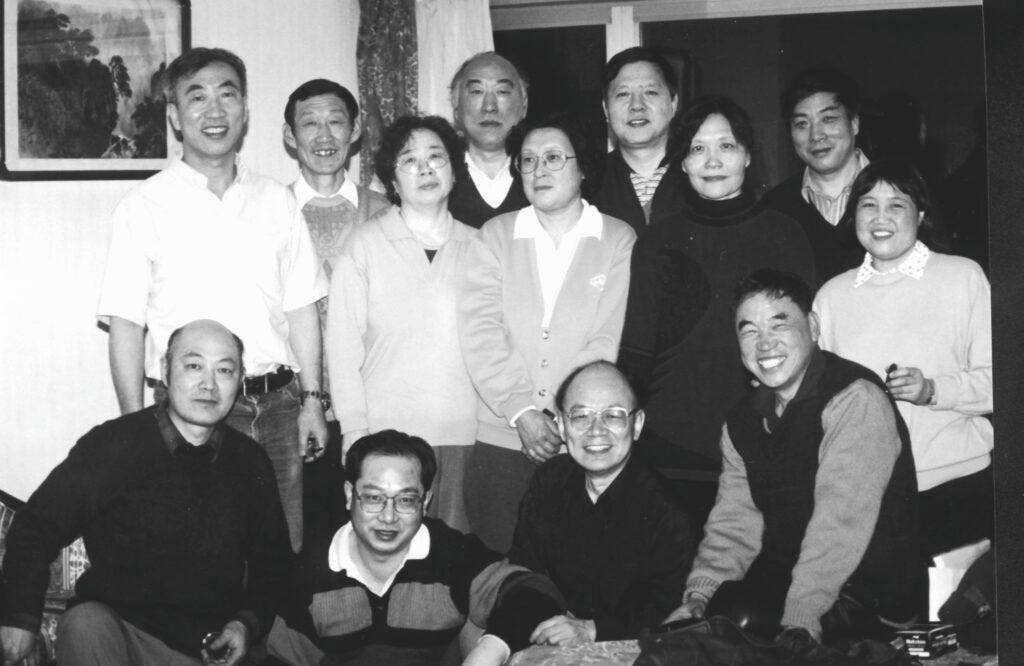
A gathering of the former members of Middle School Cultural Revolution News.
3
On September 9, 1976, Mao Zedong died. On October 6, the Gang of Four was arrested. From 1978 to 1979, the Democracy Wall movement emerged in Beijing. Unofficial publications such as April 5th Forum, Today, and Fertile Soil were the first to publish articles commemorating Yu Luoke. In November 1979, the Beijing Intermediate People’s Court issued a document rehabilitating Yu. The following summer, official publications New Era and Guangming Daily published long reports about him, calling him “an eagle against the headwinds and evil waves,” “a pioneer of ideological liberation,” and “a meteor that pierced the night.”
I have always believed that Yu Luoke was killed because his extraordinary courage, wisdom, and enormous influence had caused the dictators to feel genuine panic. So who ordered his killing? As a researcher, I have been searching for the answer for many years. According to a friend, Mr. Y, Wu De’s (then head of the Beijing Revolutionary Committee) son told him personally that it was Zhou Enlai who ordered Yu’s execution. Zhou Enlai reportedly said, “If we don’t kill a person like this, who should we kill?”
As a witness of that era, I think this is very likely. First, “On Class Origins” had a nationwide impact, so the decision in Yu’s case could not have been made at the Beijing municipal level; it most likely involved the highest levels of the Chinese Communist Party. In April 1967, Qi Benyu publicly criticized the article. Yu was arrested in January 1968 and initially sentenced to 15 years in prison, but this was suddenly changed to a death sentence. However, he wasn’t executed immediately; he was shot in March 1970. The entire process suggests that the lower government departments were unsure what to do. The decisions of whether to arrest, whether to sentence, how to sentence, and whether to execute seem to have been a result of direct intervention by a higher-level figure.
The high-level figure who ordered the execution would not have been Lin Biao or the Gang of Four. Otherwise, when Yu was later publicly rehabilitated nationwide and celebrated by Guangming Daily, it would have been exposed long ago. At that time, any bad deed that could be blamed on Lin Biao and the Gang of Four would have been attributed to them. There would have been no reason to cover for them. The only reason the authorities have always been so secretive about Yu’s death is that the high-level figure who ordered his execution is someone whose lofty reputation and glorious image the Communist Party had to protect after the Cultural Revolution, and even today.
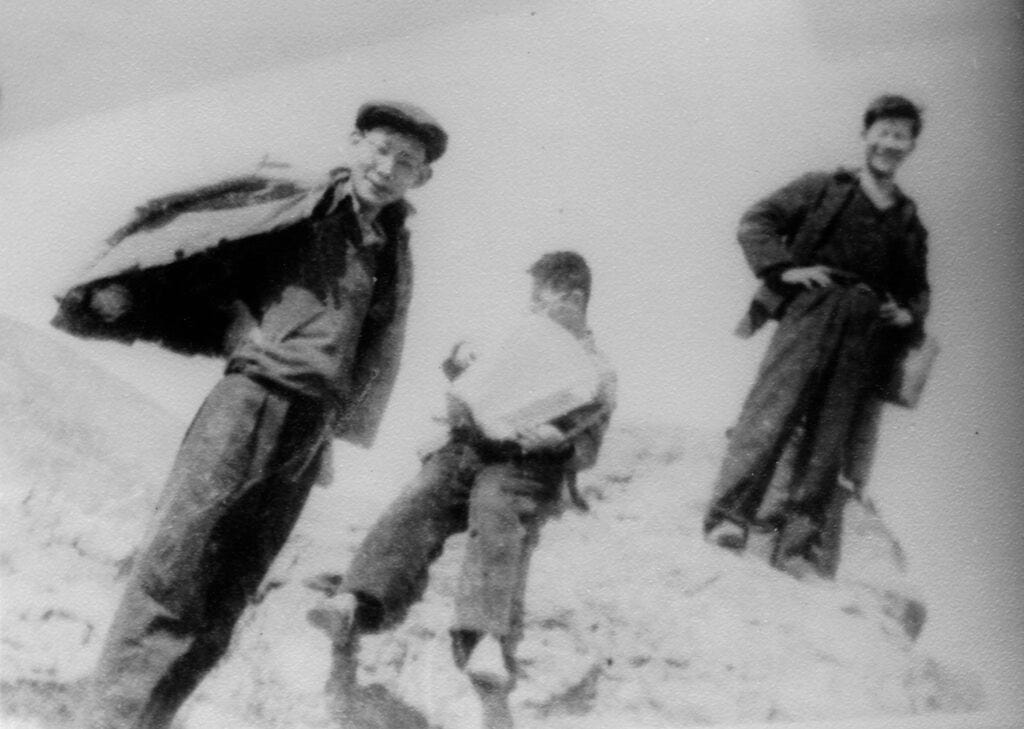
Yu Luoke (left) on a trip with friends in Beijing’s Western Hills (1967).
4
Young people today, perhaps because they are unfamiliar with that era, may not fully appreciate Yu Luoke and his “On Class Origins.”
It is true that in the article, Yu frequently quoted Mao Zedong’s sayings and targeted the so-called Liu-Deng line for criticism. But when viewed in its historical context, this does not necessarily show a limitation in his thinking, but perhaps rather a strategic approach. To understand a work, we must consider its context, its intended audience, and the opponents the author was trying to persuade. An enlightener must be skilled at teaching in a way that people can learn.
Today, we might not find it difficult to write an “On Class Origins” that seems more complete, using concepts of human rights and equality. But if such an article were put into that historical context, how many people would have understood, accepted, and publicly supported it, thus forming a significant force of resistance? In other words, if we were to rewrite “On Class Origins” for China back then, it’s unlikely we could do a better job than Yu did. He was not only courageous and brilliant but also politically shrewd. I am not saying his ideas had no limitations, but I am filled with admiration that such a brilliant flower of thought could grow in such barren and harsh soil. You have to understand how small the world was back then to grasp how great Yu Luoke was.
In the autumn of 1968, the school began “clearing class ranks.” I was put into a “study class” by the Workers’ Propaganda Team and Military Propaganda Team to be interrogated and criticized. I was accused of many things. I later learned that this was closely related to my having started a tabloid to reprint “On Class Origins.” They couldn’t prove a link between me and that “counter-revolutionary organization” in Beijing, so they did not charge me with a more serious crime.
In the early summer of 1970, while I was a sent-down youth in a Sichuan village, a friend told me that the author of “On Class Origins,” Yu Luoke, had been executed by the authorities as a “counter-revolutionary.” I was furious and heartbroken, and I remembered his name forever.
In the autumn of 1978, I was admitted to Peking University and soon participated in the Democracy Wall movement, becoming a member of the unofficial publication Fertile Soil. From new friends, especially those from the Democracy Wall, I learned many stories about Yu Luoke. In the summer of 1980, I went home to Chengdu for a family visit. My mother took out the Guangming Daily she had saved, which reported on Yu Luoke’s deeds, and said to me, “If you had been in Beijing back then, you would probably have had the same fate as him.”
At the end of that year, in a democratic election campaign at Peking University, a group of students from the Chinese literature department gave candidates a questionnaire. One question asked, “Who do you admire the most now?” I wrote down “Yu Luoke” without hesitation.
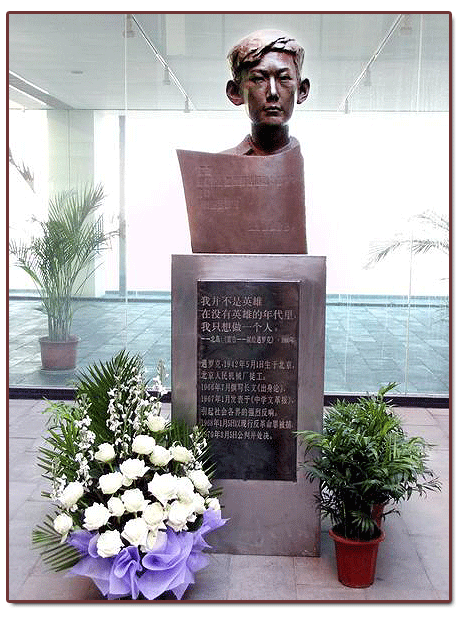
Yu Luoke’s statue at the Songzhuang Art Museum in Tongzhou, Beijing.
5
Yu Luoke was both a thinker and a martyr of that era. His moral courage is inspiring.
In prison, Yu endured various forms of torture, but he never gave in. Zhang Langlang, who was in the death row cell with Yu, later recalled that while everyone else in the cell was anxious and worried, Yu always had a smile on his face. When the prison authorities announced they were being moved to death row, everyone was stunned, their minds blank. It wasn’t fear or madness, but a kind of daze. Only Yu remained as calm as ever, even smiling as he spoke loudly to the guards.
Zhang Langlang said that Yu maintained this state until he was taken away to be shot on March 5, 1970. His emotions were incredibly stable. During one interrogation, Yu’s mocking attitude persisted. The guards used a final tactic, telling him to think about what he wanted to say to his family—a clear hint that he was about to be executed. The guards expected Yu to lose his composure, but he just said quietly, “I want a tube of toothpaste.”
In his diary on August 26, 1966, Yu wrote, “I think, if I am ever persecuted, I must remember two things. One: do not bow my head. Two: stay strong from the beginning to the end.” At that time, he had not yet published “On Class Origins,” showing that he was already mentally prepared for the potential consequences. Before his imprisonment, Yu had written a poem titled “To a Friend”:
“Reading, swimming, a brotherhood’s bond;
A cause so tough, on heroes we depend.
The pure and bright may not sacrifice the strong;
The universe weighs, while my head is light.”
On the day of his execution, Zhang Langlang asked him, “Is it worth it to die for writing ‘On Class Origins’?” Yu answered without hesitation: “It is worth it!”
Yu Luoke’s case was eventually rehabilitated. China has moved out of its darkest period, but it has not entered a bright era. The theory of bloodline—class-origin discrimination—has been somewhat alleviated but not eliminated. On one hand, we can still see power being passed down privately, with “the father is a revolutionary and the son is the successor,” and the idea that “one’s own children are the most trustworthy.” On the other hand, while persecuting dissidents, the authorities often implicate their relatives and children, reflecting serious issues with China’s human rights situation.
On the Qingming Festival in 2009, a statue of Yu Luoke was unveiled at the Songzhuang Art Museum in Tongzhou, Beijing. The front is engraved with Yu’s words: “We do not recognize any power that cannot be achieved through personal effort.” The base of the statue is engraved with Bei Dao’s poem dedicated to Yu Luoke in 1980: “I am not a hero. In an age without heroes, I just want to be a person.”
In prison, Yu Luoke left a final reflection for a fellow inmate: “What is immortality? Immortality is to resonate with future generations.” The ancients said: there are three kinds of immortality in life: establishing virtue, establishing words, and establishing achievements. Yu Luoke is immortal.
Hu Ping is the honorary editor-in-chief of Beijing Spring.
Recommended archive:
Yu Luoke: “On Class Origins” (also known as “On Family Background” in English) (English version available)
